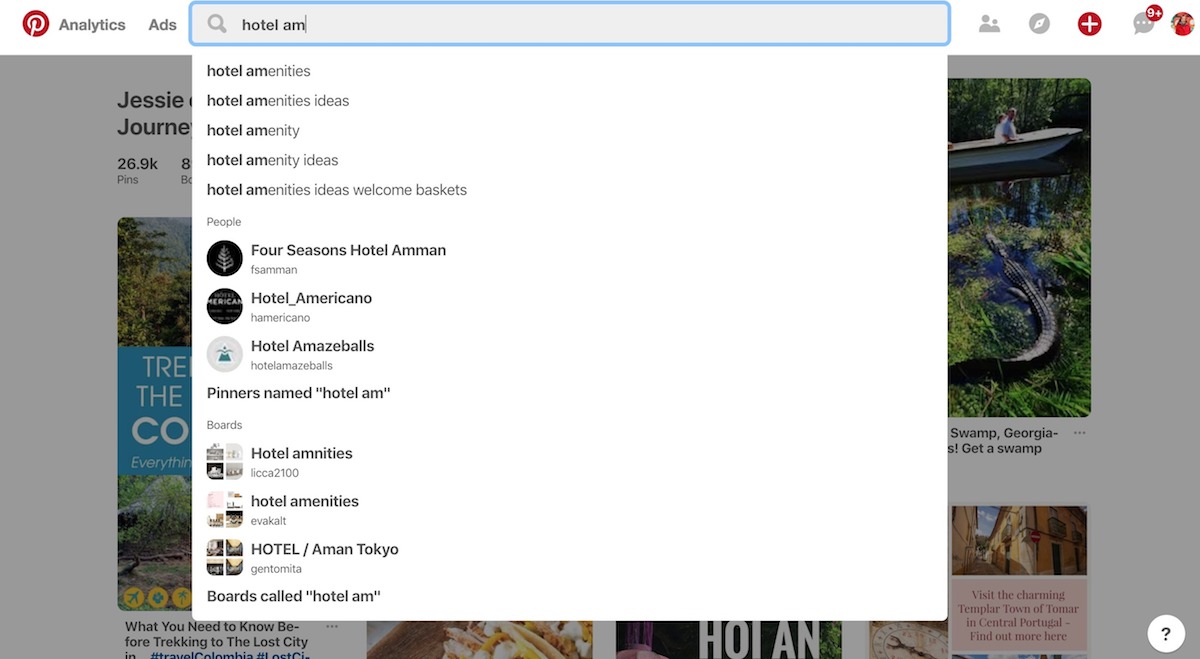
While Instagram, Facebook and Twitter continue to be hospitality brand priorities, Pinterest marketing for hotels often gets overlooked.
It's a shame, because the platform is far more than a place for DIY project ideas and home décor photos. In fact, when used correctly, it can drive traffic more easily than other social media sites.
Some of Pinterest's most popular topics are related to the hospitality industry, such as "local travel," "historical travel," and "24 hour travel."
The fact that people are searching for travel topics isn't the only justification to hop on the Pinterest train, though. Here are four other reasons Pinterest marketing for hotels should become a priority.
Explore why you should use Pinterest marketing for hotels
1. Pinterest isn't a social media platform
Actually, it's a search engine, like a visual Google.
When users log on, they're actively seeking answers, whether the question is "What's the most romantic hotel in Rome?" or "What are the best event venues in New York?"
This is useful because hotels can make themselves more discoverable by optimizing their pins for keywords, just as they do for Google. The result is that pins get seen by more than just direct followers.
Let's look at an example:
A hotel owner in Paris could search something like "hotels in Paris." Not only will they see other suggested search terms in the search bar, but they'll also be shown popular topics relating to their query, such as "best," "affordable," and "luxury." 
With this knowledge, they can craft content related to these queries.
Moreover, they can better optimize the name of their Pinterest graphic — "hotels_in_paris.jpg" is much smarter than "DSC14001.jpg" — and their pin's description so it contains the target keywords.
2. Pinterest users are buyers
According to Omnicore digital marketing agency, 87% of pinners have made a purchase because of something they saw on Pinterest.
That includes booking accommodations, evidenced by Glamping Hub, a platform for finding unique nature-centric properties.
When Glamping Hub's team decided to focus on Pinterest, their strategy involved choosing properties in unique locations.
Learn more about Pinterest marketing with our social media guide
In one month, they were able to more than double their website traffic to hit a record of 5,575 sessions. It resulted in five bookings for that one property alone! How?
By focusing on higher-quality imagery, as well as timing. It's better to publish pins when users are more likely to be looking, such as during evenings and over the weekend.
Pro tip: If you sign up for BoardBooster, you'll get a lot of great data on the best days and times to pin.
3. Your Pinterest bio is a lead gold mine
Unlike Instagram, where it's often a follow-for-follow relationship, Pinterest users follow accounts that genuinely have content they're interested in. This is great for hotels for a few reasons.
For one, properties can more easily attract their target audience by only creating boards on topics these people would be interested in, such as inspiring in-room amenities and beautiful hotel views.
Remember the importance of targeting keywords being searched. This doesn't just go for pin descriptions, but for board names, too.
Notice in this example how Pinterest shows the most popular search terms when users begin typing in "hotel amenities." They can use these search terms in board names. 
Another benefit: Hotels can use their bios strategically. Before a pinner hits the follow button, they'll often look at an entire profile. This includes the bio, which can include the property's mission statement, as well as a link to a lead magnet to capture the viewer's email.
So, instead of linking directly to your homepage, you might offer a free packing list or local city guide that they receive after they've subscribed to your email list. Once on your email list, you can nurture your subscriber with regular emails to stay front of mind.
4. Small changes can lead to big results
Simple tweaks in the way hotels create pins can lead to big changes.Kid & Co — a collection of family-friendly hotels, rentals and private homes — offers an example.
While they understood the importance of gorgeous images and text overlays, their original wording focused on spreading the brand name. It wasn't engaging the reader when on the hotel city guides on Pinterest.
When they switched from the title template "Kid & Coe City Scout: [City Name]" to "[City Name] With Kids", they saw a surge in Pinterest traffic to their website, as the content value to the reader became clearer.
Remember, when marketing your hotel on social media it's smart to diversify your traffic and lead-generating streams. While Instagram, Facebook and Twitter have their own pros and cons, a clear advantage of Pinterest is the intention of its users and the ability to have content found — even with a small following — by strategically using keywords.
Give it a try, and it's likely you'll see a helpful surge in website traffic for your property.
UP NEXT: 14 social media tips for hotels




